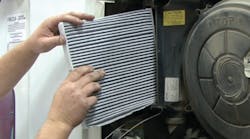Fleets are concerned about the safety and health of their drivers, as well as the operation of key systems in company vehicles.
The more experienced managers understand that the environment inside the cabin of a heavy duty vehicle is subjected to assault from exhaust, pollen, bacteria, dirt, dust and soot. These elements can clog heating, ventilation and air conditioning (HVAC) systems and affect drivers.
To help alleviate that concern, manufacturers of vehicle filters are producing filtration systems with added features, such as activated carbon, to remove volatile organic compounds. In another innovation, and an industry exclusive, Luber-finer has partnered with the manufacturer of Arm & Hammer baking soda to improve a filter’s ability to remove offensive odors.
POTENTIAL DANGER
An improperly functioning air filter may not allow a vehicle’s cab defroster to operate at its designed capacity. This could result in reduced visibility, which is dangerous for the driver and other motorists, as well as pedestrians.
An inefficient defroster may also slow the rate of work being performed – impacting profits.
ALLERGIES
More than 40 million people in the U.S. suffer from allergies, and one in six have asthma or some other type of allergy caused by airborne contaminants. Having a vehicle with a technologically-advanced filtration system could reduce the number of irritants affecting the driver.
Realize that a driver who is dealing with the symptoms of allergies can just as easily succumb to distractions caused by sneezing, blurry vision and headaches brought on by unclean air entering the cabin compartment as the distractions brought on by a cell phone or other mobile device.
It is estimated that a properly functioning air filter removes up to 98 percent of particles before being inhaled by a driver. This could minimize the potentially disruptive effects of allergens on a driver while operating the vehicle.
A BEST PRACTICE
For heavy duty trucks, cabin air filters should be replaced according to the guidelines in the owner’s manual. However, a best practice is to change the filters on a seasonal basis because of the pollutants that are prevalent in different seasons.
Preventing harmful contaminants from entering the cabin or cleaning the air of unwanted odors can reduce the risks of driving with distracting allergy symptoms and help make the driver safer and more productive.
John Gaither is the director of heavy duty engineering for Luber-finer (www.Luber-finer.com). The company is one of the world's largest suppliers of filters and filtration products.



